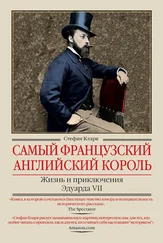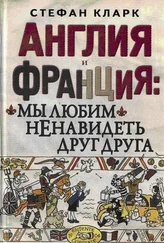Стефан Кларк - 1000 Years of Annoying the French
Здесь есть возможность читать онлайн «Стефан Кларк - 1000 Years of Annoying the French» весь текст электронной книги совершенно бесплатно (целиком полную версию без сокращений). В некоторых случаях можно слушать аудио, скачать через торрент в формате fb2 и присутствует краткое содержание. ISBN: , Издательство: Transworld Digital, Жанр: Старинная литература, на английском языке. Описание произведения, (предисловие) а так же отзывы посетителей доступны на портале библиотеки ЛибКат.
- Название:1000 Years of Annoying the French
- Автор:
- Издательство:Transworld Digital
- Жанр:
- Год:неизвестен
- ISBN:9781407067629
- Рейтинг книги:3 / 5. Голосов: 1
-
Избранное:Добавить в избранное
- Отзывы:
-
Ваша оценка:
- 60
- 1
- 2
- 3
- 4
- 5
1000 Years of Annoying the French: краткое содержание, описание и аннотация
Предлагаем к чтению аннотацию, описание, краткое содержание или предисловие (зависит от того, что написал сам автор книги «1000 Years of Annoying the French»). Если вы не нашли необходимую информацию о книге — напишите в комментариях, мы постараемся отыскать её.
1000 Years of Annoying the French — читать онлайн бесплатно полную книгу (весь текст) целиком
Ниже представлен текст книги, разбитый по страницам. Система сохранения места последней прочитанной страницы, позволяет с удобством читать онлайн бесплатно книгу «1000 Years of Annoying the French», без необходимости каждый раз заново искать на чём Вы остановились. Поставьте закладку, и сможете в любой момент перейти на страницу, на которой закончили чтение.
Интервал:
Закладка:
Similarly, the duc de Brabant, arriving late and not wanting to miss the battle, did not take the time to put on his coat of arms. He rushed into the attack dressed as a herald, and when he was beaten in combat and attempted to surrender, he was killed, just as a simple herald would have been.
Not that being taken prisoner would have saved him, because what shocks the French most about the Battle of Agincourt or Azincourt is not so much the way in which three successive waves of their men went waddling helplessly through the mud to their deaths in an almost exact repetition of the errors at Crécy, but the fate of the prisoners.
Estimates vary as to the number of hostages taken in the first couple of hours of the battle, but French sources put it as high as 1,500. Having surrendered, they were under oath not to rejoin the fighting, and were probably confident of going home again as soon as their relatives had taxed the local peasantry enough to pay the ransom.
However, the lord of a nearby chateau, a man called Ysambart d’Azincourt, had noticed the ruckus going on down the road, and went out with a horde of some 600 locals to have a go at the undefended English baggage carts, which were carrying the plunder that Henry’s men had dragged from Harfleur. Seeing an attack at his rear, and fearing that the French hostages, if freed, would rejoin the battle, Henry ordered each man to execute his prisoners.
This order didn’t go down well with the soldiers who had nabbed such valuable human booty, so Henry was forced to send 200 of his most bloodthirsty and lower-class archers to do the job. Before long, the unarmed, and often trussed-up, French gentlemen were being beaten, stabbed or burnt to death.
Even today, outrage about this massacre can be felt in every French source relating to the battle, although one could argue that this is a bit rich coming from a country that indulged in the wholesale public guillotining of its own aristocracy at the end of the eighteenth century. It’s true, killing the prisoners was a savage act by a supposedly chivalrous king, and contrary to all the rules of fifteenth-century warfare, but it was done while the battle was still hanging in the balance. Although things were definitely going in Henry’s favour, there were still enough French soldiers in the area to attack the English from the rear or the flank and win a victory. Or, perhaps more sensibly, wait until Henry’s army moved on – as they would have to do, being sorely short of food – and then pick them off in skirmishes all the way to Calais.
But French chroniclers say that the survivors were ‘sickened at the bloodshed’ (scared of getting thrown into the mud and spiked, one could argue), and the remaining knights decided not to attack. Many turned and went home – one of them, Jean, Duke of Brittany, doing a bit of unpatriotic pillaging of northern France with his Breton soldiers as he went.
Henry’s troops rested the night at Maisoncelle and then went out to the battlefield next morning to ‘clear up’. As usual, the dead were stripped of their valuable weapons and jewellery and the wounded were asked whether they were in Who’s Who , and, if not, sent to join the list of the dead.
In all, the French had lost some 10,000 men, including – yet again – the ‘flower of France’ (they seem to have had several bouquets of these aristocratic petals). This compares to English losses of around 300, with just ten or so noble names amongst them.
Only when the English had left the area did the French come out of the woods. The retinues of the aristocratic dead found their masters and took the bodies back home for burial. The rest of the casualties were stripped naked by the local peasants and left to rot. It was not until several days later, on the orders of a nobleman who had lost several members of his family, that a mass grave was dug and, according to contemporary accounts, 5,800 bodies were buried, with a thick hedge of thorns planted around the site so that dogs and wolves would not dig up the bones.
Henry and his exhausted men, meanwhile, dragged themselves the 80 kilometres to Calais, where many of the soldiers managed to lose all their booty paying extortionate prices for food and drink. Henry himself claimed the most valuable prisoners and got them on board ships bound for England.
Despite a raging storm, all his ships arrived home safely, and Henry’s conviction that God was on his side must have been stronger than ever. How else could he explain the way in which such a total, disabling victory over the cream of the French army had been won by a tired-out band of lower-class English dysentery-sufferers?
What Henry didn’t know was that England was soon to come up against an equally low-class French opponent, a fervent believer who would reverse the tide of recent history …
1 And whose diet is, of course, frogs. Although in the fourteenth century ‘frog’ was not yet an insult applied to the French – it was usually aimed at the marsh-living Dutch.
2 The Church in those days seems to have taken a much more liberal line on those Ten Commandments that deal with killing people and coveting your neighbour’s chattels.
3 The medieval French term for men-at-arms, gent d’armes , is the origin of the word gendarme .
4 I love that ‘again’, as if God had turned on the sun just to annoy the French.
5 This is of course the Prince of Wales’s motto to this day, though subsequent princes have not adopted John of Bohemia’s custom of fighting while tied up and blind. Except at private parties, of course.
6 This should not be confused with the modern word for trucker, and it is generally safe to go in roadside restaurants with a ‘Routiers’ sign outside.
7 Stories that say this was because of a French dockers’ strike are untrue.
8 After Waterloo, of course. They don’t really remember Crécy or Trafalgar; they think that Napoleon’s failure to get to Moscow was a strategic withdrawal; and they don’t regard the Nazi Occupation as a defeat – it was more of a waiting period until Charles de Gaulle was ready to come back and seal victory.
9 Contrary to popular belief, Henry doesn’t give his ‘once more unto the breach, dear friends’ speech before Agincourt. As the breach image suggests, he’s talking at the siege of Harfleur, and referring to holes in the town walls. This is why he mentions that if they fail, they will ‘close up the wall with our English dead’.
4
Joan of Arc: A Martyr to French Propaganda
Concerning Lady Joan, whom they call the Virgin, on this day a sermon was preached at Rouen, while she was on a scaffold so that everyone could see very clearly that she was in male clothing, and there she was told the great and powerful ills that she had brought down on Christendom … and several great, enormous sins that she did commit, and cause to be committed, and how she caused ordinary people to commit idolatry because by her false hypocrisy they followed her as a holy virgin.
A typically biased English view of Joan of Arc, aka ‘The Witch of Orléans’, one might assume.
But the above is actually a translation of a French text, the Journal d’un Bourgeois de Paris , a contemporary record of life and current opinion in the city between 1405 and 1449. And while the anonymous author wasn’t a fan of Joan’s, he wasn’t just some pro-English collaborator, either. Elsewhere, he is shocked that the English ‘burn those they can’t ransom, rape nuns and eat meat on a Friday’, and writes scathingly that ‘the English, by nature, always want to fight their neighbours for no reason, which is why they always die badly’.
The modern French opinion of Joan of Arc couldn’t be more different. She is credited with winning the Hundred Years War by ‘booting the English out of France’, and is revered as a military heroine – the French navy has a helicopter carrier called Jeanne d’Arc , and during the Second World War she was the reason for the Free French adding the Cross of Lorraine (her home region) to their flag. Her status as an icon is so strong that she inspired one of the first movies ever made: a film by the Lumière brothers that dates back to 1899. (Though it must have been hard making a silent movie about a girl who hears voices.)
Читать дальшеИнтервал:
Закладка:
Похожие книги на «1000 Years of Annoying the French»
Представляем Вашему вниманию похожие книги на «1000 Years of Annoying the French» списком для выбора. Мы отобрали схожую по названию и смыслу литературу в надежде предоставить читателям больше вариантов отыскать новые, интересные, ещё непрочитанные произведения.
Обсуждение, отзывы о книге «1000 Years of Annoying the French» и просто собственные мнения читателей. Оставьте ваши комментарии, напишите, что Вы думаете о произведении, его смысле или главных героях. Укажите что конкретно понравилось, а что нет, и почему Вы так считаете.












